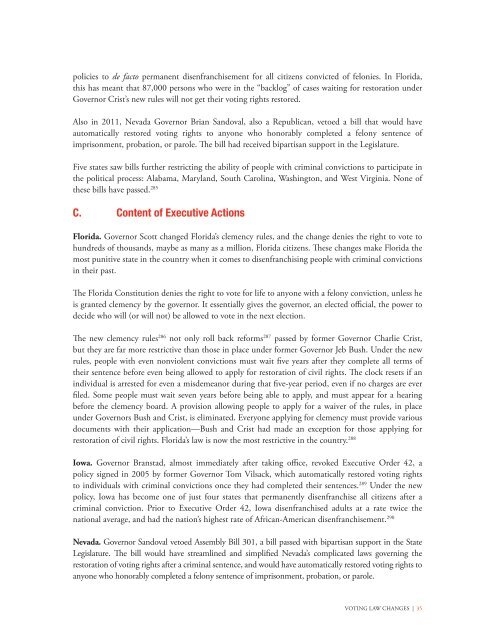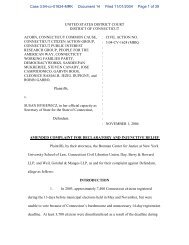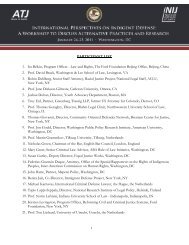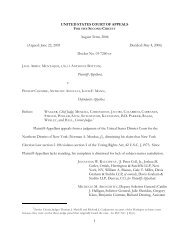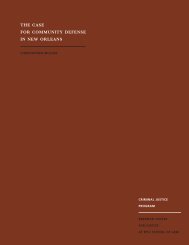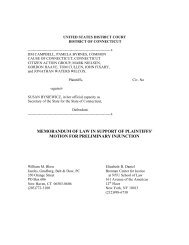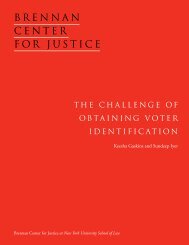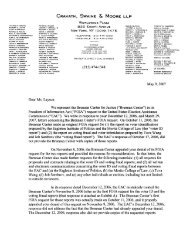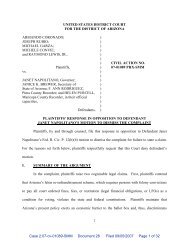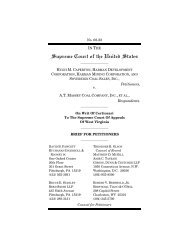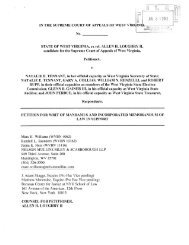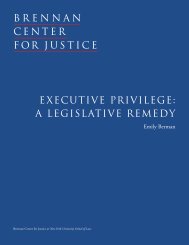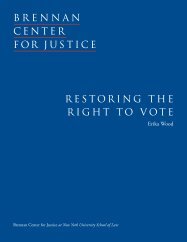BRENNAN CENTER FOR JUSTICE
BRENNAN CENTER FOR JUSTICE
BRENNAN CENTER FOR JUSTICE
Create successful ePaper yourself
Turn your PDF publications into a flip-book with our unique Google optimized e-Paper software.
policies to de facto permanent disenfranchisement for all citizens convicted of felonies. In Florida,<br />
this has meant that 87,000 persons who were in the “backlog” of cases waiting for restoration under<br />
Governor Crist’s new rules will not get their voting rights restored.<br />
Also in 2011, Nevada Governor Brian Sandoval, also a Republican, vetoed a bill that would have<br />
automatically restored voting rights to anyone who honorably completed a felony sentence of<br />
imprisonment, probation, or parole. The bill had received bipartisan support in the Legislature.<br />
Five states saw bills further restricting the ability of people with criminal convictions to participate in<br />
the political process: Alabama, Maryland, South Carolina, Washington, and West Virginia. None of<br />
these bills have passed. 285<br />
C. Content of Executive Actions<br />
Florida. Governor Scott changed Florida’s clemency rules, and the change denies the right to vote to<br />
hundreds of thousands, maybe as many as a million, Florida citizens. These changes make Florida the<br />
most punitive state in the country when it comes to disenfranchising people with criminal convictions<br />
in their past.<br />
The Florida Constitution denies the right to vote for life to anyone with a felony conviction, unless he<br />
is granted clemency by the governor. It essentially gives the governor, an elected official, the power to<br />
decide who will (or will not) be allowed to vote in the next election.<br />
The new clemency rules 286 not only roll back reforms 287 passed by former Governor Charlie Crist,<br />
but they are far more restrictive than those in place under former Governor Jeb Bush. Under the new<br />
rules, people with even nonviolent convictions must wait five years after they complete all terms of<br />
their sentence before even being allowed to apply for restoration of civil rights. The clock resets if an<br />
individual is arrested for even a misdemeanor during that five-year period, even if no charges are ever<br />
filed. Some people must wait seven years before being able to apply, and must appear for a hearing<br />
before the clemency board. A provision allowing people to apply for a waiver of the rules, in place<br />
under Governors Bush and Crist, is eliminated. Everyone applying for clemency must provide various<br />
documents with their application—Bush and Crist had made an exception for those applying for<br />
restoration of civil rights. Florida’s law is now the most restrictive in the country. 288<br />
Iowa. Governor Branstad, almost immediately after taking office, revoked Executive Order 42, a<br />
policy signed in 2005 by former Governor Tom Vilsack, which automatically restored voting rights<br />
to individuals with criminal convictions once they had completed their sentences. 289 Under the new<br />
policy, Iowa has become one of just four states that permanently disenfranchise all citizens after a<br />
criminal conviction. Prior to Executive Order 42, Iowa disenfranchised adults at a rate twice the<br />
national average, and had the nation’s highest rate of African-American disenfranchisement. 290<br />
Nevada. Governor Sandoval vetoed Assembly Bill 301, a bill passed with bipartisan support in the State<br />
Legislature. The bill would have streamlined and simplified Nevada’s complicated laws governing the<br />
restoration of voting rights after a criminal sentence, and would have automatically restored voting rights to<br />
anyone who honorably completed a felony sentence of imprisonment, probation, or parole.<br />
voting LAW CHANGES | 35


